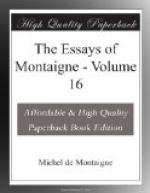I have lately been reading the history of Tacitus quite through, without interrupting it with anything else (which but seldom happens with me, it being twenty years since I have kept to any one book an hour together), and I did it at the instance of a gentleman for whom France has a great esteem, as well for his own particular worth, as upon the account of a constant form of capacity and virtue which runs through a great many brothers of them. I do not know any author in a public narrative who mixes so much consideration of manners and particular inclinations: and I am of a quite contrary opinion to him, holding that, having especially to follow the lives of the emperors of his time, so various and extreme in all sorts of forms, so many notable actions as their cruelty especially produced in their subjects, he had a stronger and more attractive matter to treat of than if he had had to describe battles and universal commotions; so that I often find him sterile, running over those brave deaths as if he feared to trouble us with their multitude and length. This form of history is by much the most useful; public movements depend most upon the conduct of fortune, private ones upon our own. ’Tis rather a judgment than a narration of history; there are in it more precepts than stories: it is not a book to read, ’tis a book to study and learn; ’tis full of sententious opinions, right or wrong; ’tis a nursery of ethic and politic discourses, for the use and ornament of those who have any place in the government of the world. He always argues by strong and solid reasons, after a pointed and subtle manner, according to the affected style of that age, which was so in love with an inflated manner, that where point and subtlety were wanting in things it supplied these with lofty and swelling words. ’Tis not much unlike the style of Seneca: I look upon Tacitus as more sinewy, and Seneca as more sharp. His pen seems most proper for a troubled and sick state, as ours at present is; you would often say that he paints and pinches us.
They who doubt his good faith sufficiently accuse themselves of being his enemy upon some other account. His opinions are sound, and lean to the right side in the Roman affairs. And yet I am angry at him for judging more severely of Pompey than consists with the opinion of those worthy men who lived in the same time, and had dealings with him; and to have reputed him on a par with Marius and Sylla, excepting that he was more close. Other writers have not acquitted his intention in the government of affairs from ambition and revenge; and even his friends were afraid that victory would have transported him beyond the bounds of reason, but not to so immeasurable a degree as theirs; nothing in his life threatened such express cruelty and tyranny. Neither ought we to set suspicion against evidence; and therefore I do not believe Plutarch in this matter. That his narrations were genuine and straightforward may,




